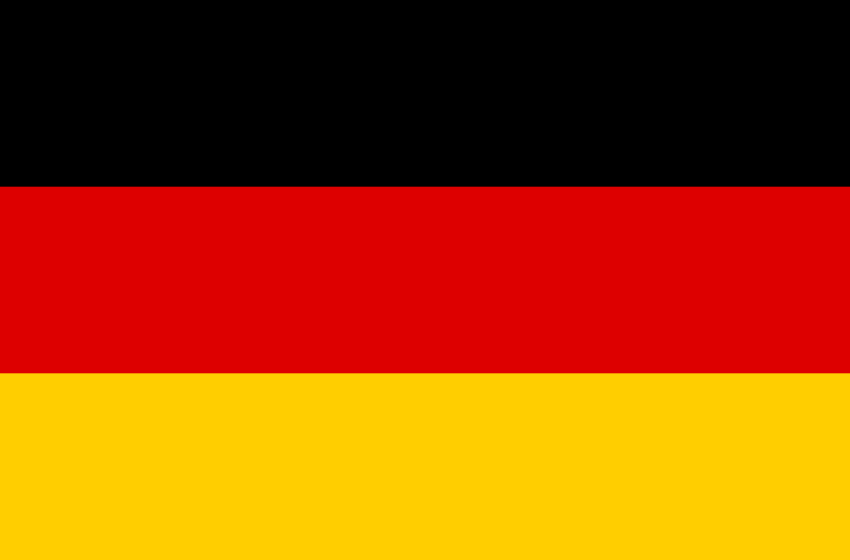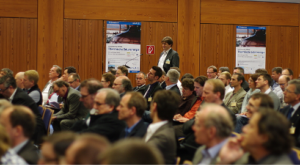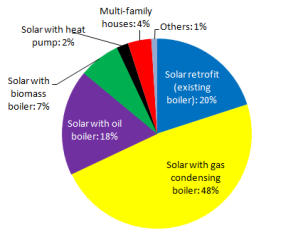Germany: “A standstill is not the answer, a system solution is.”
May 26, 2013
The German solar thermal market has shrunk yet again. The figures for 2012 show a 9% drop in sales compared to 2011. This year has been off to a very slow start as well: In the first quarter of 2013, collector area sales were down by 19% compared to the same period last year, according to the BDH/BSI statistics. The industry seems to finally wake up to the harsh reality, conceding that something is fundamentally wrong with the market’s development. Signs of a wake-up call were quite apparent at the yearly Solar Thermal Energy Symposium, which took place at the end of April and had been organised by the German East-Bavarian Institute for Technology Transfer, OTTI. This time, there was none of the usual talk about being patient and letting the high oil price do its work. At the start of the event, representatives from associations, scientific institutes and the Federal Environment Ministry spoke openly about the industry’s home-grown problems.
But why is it that the market has almost been cut in half since the boom year of 2008 and what can be done about it? Every one of the almost 400 invited experts agreed that costs must go down. But opinions were divided on how to achieve any reductions. Until now, the industry has been quite content with relying on the oil and gas prices to rise sooner or later and make solar thermal competitive again. But over the last two years, a new entrant to the market has grown into a serious threat: The modules of photovoltaic systems are becoming ever cheaper, reducing the price for thermal energy from heat pumps driven by solar electricity. The electricity-driven variant had become almost as inexpensive as heat from solar thermal systems, explained Harald Drück, Head of the Research and Testing Centre for Thermal Solar Systems (TZS) at the ITW, University of Stuttgart, Germany.
Representatives of the solar industry association BSW-Solar were correct in pointing to the electricity shortages heat pumps would create during a German winter, when there was no sun shining, no wind blowing, but the largest demand for heating. This kind of weather is not uncommon in Central Europe. Homeowners, however, would not be interested at all in such deliberations, said Carsten Kuhlmann from German heating manufacturers association BDH. It was neither the responsibility of individual customers, nor did they have an interest in buying a heating system that would be beneficial to the electricity sector as a whole. And it would stay that way unless the political framework changes – which was not going to happen any time soon as general elections will be held in Germany in September 2013.
More to the point, said Kuhlmann, the solar thermal industry had been ignoring the heat pump completely. Kuhlmann, who always thought in systems and not in components, said the normal case should be to sell a heat pump not as a stand-alone device, but as part of a system package. ”If a heat pump is not sold together with solar thermal equipment, solar thermal will lose,” he added, because heat pumps had been gaining more and more ground, especially in the sector for new buildings. Hence, even in this regard, competition among the renewable heating technologies seems to get more intense.
The BDH statistics also show that the share of heating systems which are sold in combination with solar thermal dropped again in 2012, from 31 % in 2011 to 27 % last year. This means that solar thermal companies did not profit from the good business climate in the boiler industry. “Last year’s negative trend in solar thermal installations in existing building stock was partially offset by an upwards trend in new construction. Otherwise, the decline of the market in 2012 would have been even worse,” explained independent consultant Dietmar Lange.
Whether combined with a heat pump or a gas boiler, the discussion always winds up with speaking about costs. The end consumer prices for solar thermal systems have remained at the same level for years. Although some components, such as the collector, have fallen in price, they only account for a fraction of the overall system costs and installers do not always pass down cost reductions. The latter has also not gone down well with the BSW-Solar, which now wants to open a dialogue with the plumber associations. There is not much else to do, really. As Matthias Reitzenstein, Spokesperson for the Solar Thermal task force at BSW-Solar, explained, the money just wasn’t there for big campaigning. The industry had not been providing any funds.
‘Think of system solutions’ was another item on the Industry Task List presented by Berthold Goeke, Head of the Climate Protection subdivison at the Federal Environment Ministry, BMU. An equally important task for the industry was information exchange, he noted. In short: “Present solar thermal as an essential element of the energy revolution and as an important part of future homes.” The profound criticism that the environment ministry directed at the industry is an important sign of how much the German thermal market is now in gridlock. “A standstill is not the answer, a system solution is.”
A survey among 1,000 homeowners on behalf of the BSW-Solar shows that the solar thermal industry has neglected its PR over the last years. “80 % of the homeowners do not know about the funding available through the MAP [German Market Rebate Programme for Renewable Energies], even though it has already been more than ten years in which the MAP has supported solar thermal clients through investment subsidies. Only 1.4 % of German homeowners know something about the MAP if the programme is not part of a multiple-choice question,” said Jörg Mayer, Managing Director of German solar industry association BSW-Solar.
This text has been written in collaboration with Jan Gesthuizen, editor at Sun & Wind Energy. The German edition of the magazine, called Sonne Wind & Wärme, contains a longer version of this article, including a complete account of the conference. (http://www.sonnewindwaerme.de)


